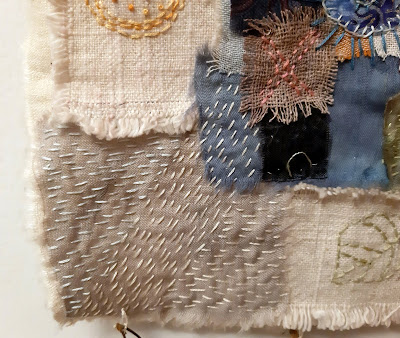skip to main |
skip to sidebar
Every thing about this bag was a hip experience - choosing the materials, designing it - sewing it - admiring it - photographing it (which my husband did).
Best model ever!
So photogenic!
I don't remember who bought this bag and where it is now. I wish a little bit I would still have it... I hope, it is enjoyed and admired... It surely is a little treasure...
Made with leather, fabric and an old doily.
This one is a tiny bit more sophisticated and shows some influence from American artist Jude Hill.
The Japanese method of boro is very meditative and requires slow stitching. You can not rush with it, your soul is very much taking part in it, and you work intuitive. You don't strive for perfection, you don't plan too much, you just stitch and choose pieces and patches and remnants of fabric, and match here and there, and then change again, slowly and joyfully, maybe stitching a story, or a little statement, or just a colorful lovely piece, that you can make into a small bag, or a book cover, or a petite wall hanging, or into nothing at all but to admire just so. If your fabric is old and tattered and frayed, even better so, it will add grace and meaning. And if you can mix cotton and silk and hemp and wool and linen, wow!

Give it a try! :-)
Boro Boro is the ancient Japanese "art" of fixing tattered and
worn clothing.
The word boro literally means "tattered". The fabric
would be mended and patched with small visible stitches, again and
again, reinforcing the garment. A kind of modern art form developed from
it, resembling pieces of patchwork that entered the modern fashion
world. Neither in the ancient traditional objects, nor in today's modern
versions was and is perfect execution required. The stitching of the functional
embroidery should lead to a sense of simple beauty. The Japanese people
with their great talent for aesthetic and their Wabi Sabi view always
achieve this, even with the acceptance of imperfection.
Some time ago I attended a boro workshop with Laura Miryam in her
lovely home in Moshav Aviel, north of Hadera.
https://www.lauramiryam.com/
For me, always striving to be perfect in my
work, it was not easy to loosen up and just let go... But - I somehow
managed and I must say I did enjoy the process. This is my first very
humble and humorous attempt at a boro stitched piece - and with Laura's
gentle guidance I think it came out rather nicely.
I called it: "The elephants and the upside down woman" - I know, it's kind of funny! :-) And as you can see, the pomegranates were just blooming.
 I started another piece, I will show it in my next post.
I started another piece, I will show it in my next post.



























